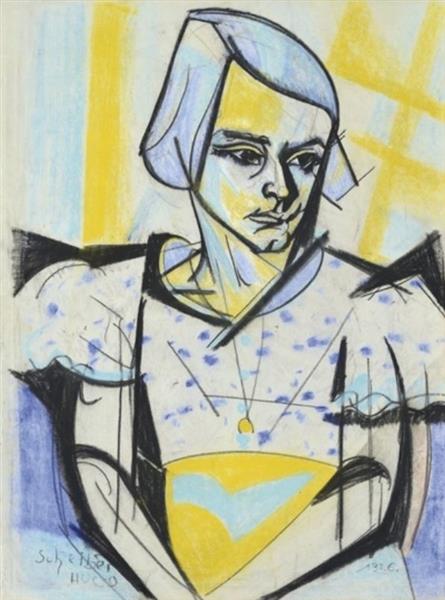Description
The work "Gyermekportré" of 1926, by the Hungarian painter Hugó Scheiber, is a captivating representation that transmits both the childhood innocence and the mastery of the artist in the capture of human essence through color and shape. Scheiber, known for his unique style within the Fauvist movement, enters the psychology of his subject with a technique that combines a loose and vibrant brushstroke with a bold and expressive palette.
In "Gyermekportré", the main focus is a child, which can be interpreted as a symbol of purity and potential. The central figure stands out for its frontality, placed in a balanced compositional structure that imposes an immediate dialogue with the viewer. The child's face is captured in an instant of contemplation, with an expression that invites introspection, which can refer to the emotional connection that Scheiber sought to establish between his art and the observer. Attention to details in the face, particularly in the eyes, suggests a deep understanding of childhood subtleties; The child's look seems to have a story, an internal universe that promises to explore.
The "Gyermekportré" palette is remarkable for its use of vibrant and contrasted colors, where yellow and orange tones predominate, accentuated with blue and green touches that resemble a warm environment. This chromatic choice is not accidental, since it follows the parameters of Fauvism, movement of which Scheiber was part, which sought to express emotion and sensitivity through an unnatural coloration. The colors in the work not only fulfill the function of describing reality, but also reveal a more subjective and personal interpretation of the child's world. This use freed from color confers an almost dreamlike atmosphere to painting, where time seems to be dilated and space is transformed into a field of sensations.
Another aspect to consider is the brushstroke technique used by the artist. The paths are energetic and are perceived as a dance on the canvas; The resulting texture provides a sense of dynamism and life to the image, taking the viewer beyond a simple visual representation to a sensory experience. It is through this technique that Scheiber manages to establish an emotional connection, anticipating the path that modern art would explore in the twentieth century.
It is worth mentioning that Hugó Scheiber, although less known than some of his contemporaries, has been an important bridge between impressionism and modernism in Hungarian art. Its legacy can be observed in works that defy the aesthetic norms of its time and that invite a deeper reflection on subjectivity and individual perception. "Gyermekportré" is part of this context, highlighting both for its technical quality and for its ability to resonate emotionally with the public.
Consequently, "Gyermekportré" is not simply a child's portrait; It is an invitation to explore the complexity of human experience through a lens of color, shape and emotion. In summary, this work encapsulates the essence of Scheiber's artistic search and its ability to capture fleeting moments of childhood, reminding us of the beauty and fragility of life through the gaze of a child.
KUADROS ©, a famous paint on your wall.
Hand-made oil painting reproductions, with the quality of professional artists and the distinctive seal of KUADROS ©.
Art reproduction service with satisfaction guarantee. If you are not completely satisfied with the replica of your painting, we refund your money 100%.

